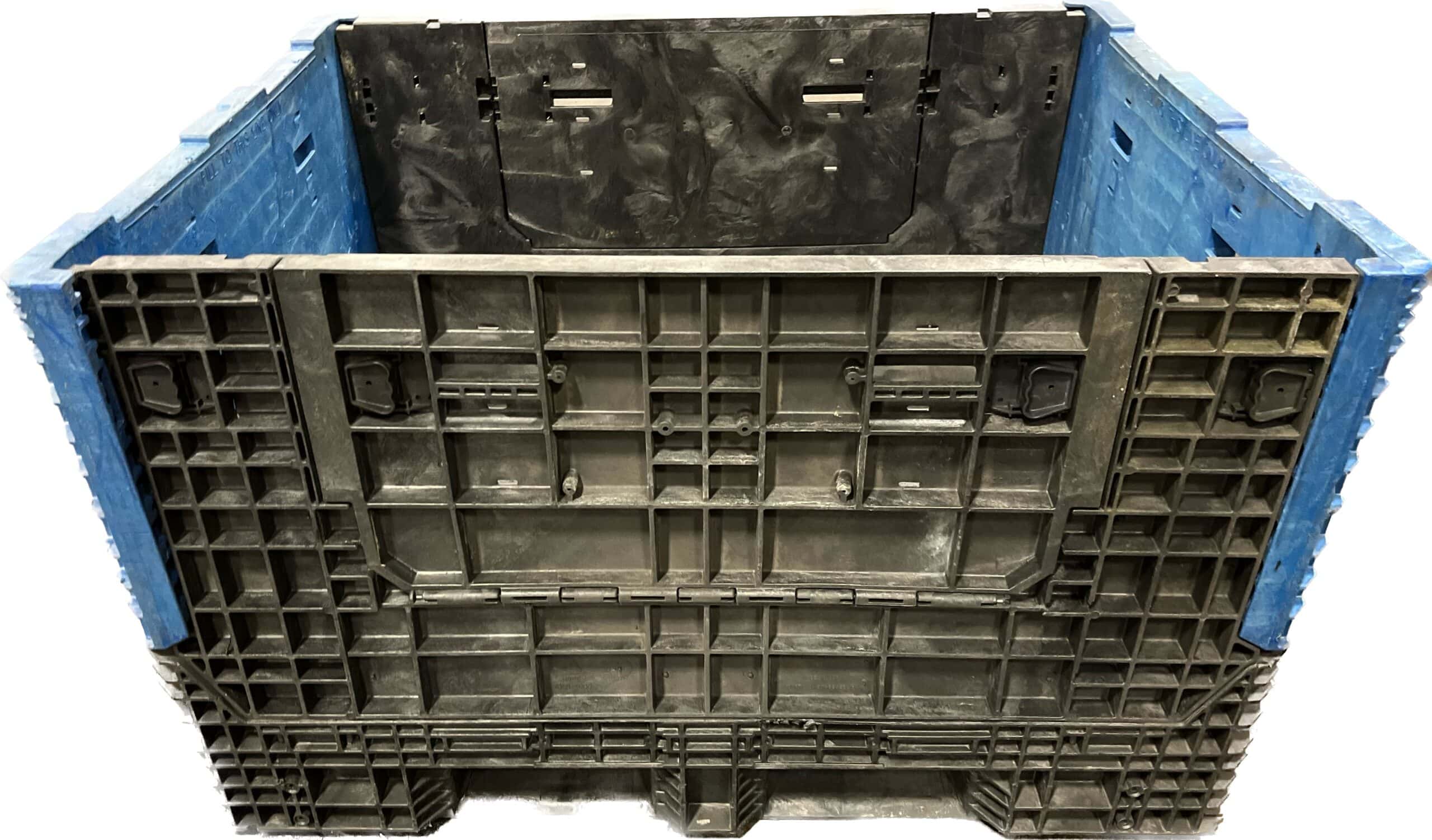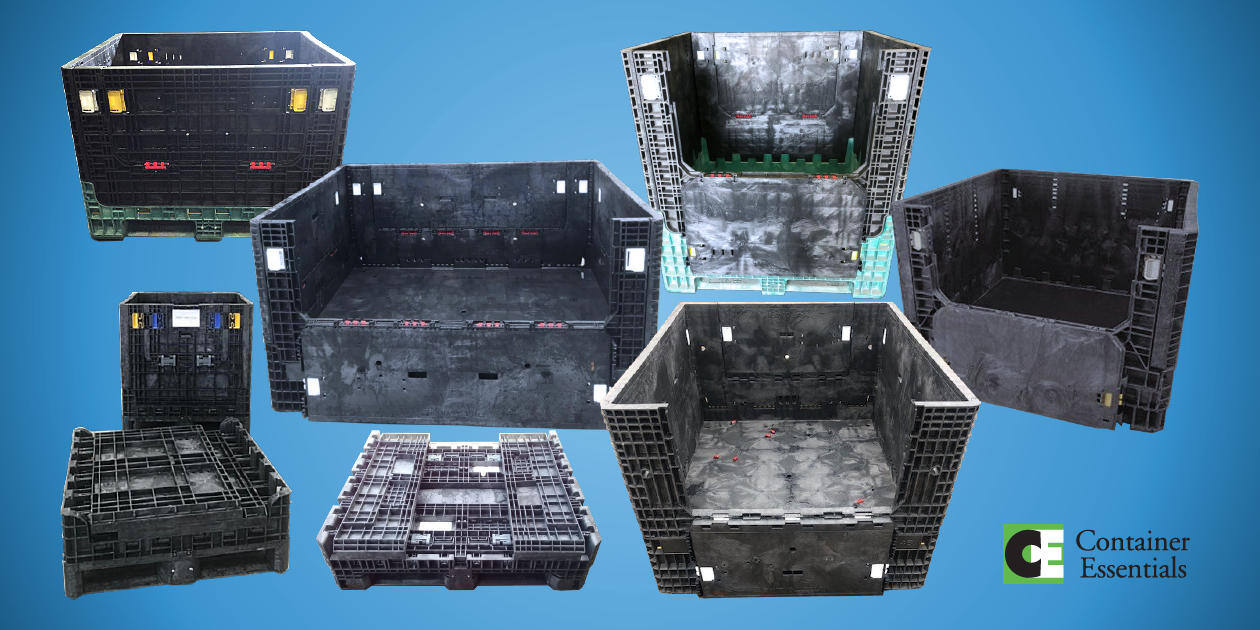The Ultimate Guide to Choosing the Right Mass Containers for Your Service Needs
Choosing the suitable bulk containers is vital for any business that relies upon effective logistics. Numerous types of containers exist, each designed for details materials and applications. Factors such as dimension, material compatibility, and governing standards play a significant function in this decision-making procedure. Recognizing these aspects can bring about boosted operational performance. Several organizations forget vital elements that might improve their total performance and sustainability. What are these considerations?
Understanding Different Kinds of Mass Containers
Mass containers work as essential tools for organizations looking for reliable storage and transport remedies. These containers come in different types, each developed to satisfy details operational needs. One usual type is the intermediate bulk container (IBC), which is excellent for liquid and granulated materials, providing a balance of ability and maneuverability. Another preferred alternative is the mass bag, or FIBC, suitable for completely dry, flowable items. These flexible containers are light-weight and can be easily delivered and stored. For much heavier materials, inflexible mass containers are often employed, providing sturdiness and stability for risk-free handling. Furthermore, there are specialized containers customized for unsafe products, making sure compliance with security regulations. Understanding the distinctive attributes of these bulk container kinds permits companies to make informed choices that enhance logistics and lower prices. By selecting the appropriate container, companies can boost their operational performance and enhance their supply chain procedures.
Secret Material Considerations for Bulk Containers
When selecting mass containers, it is vital to contemplate the materials utilized in their construction. Aspects such as stamina, sturdiness, and chemical compatibility play a vital function in ensuring the containers meet particular functional requirements. Furthermore, weight and transportability problems can influence both effectiveness and transport logistics.
Material Toughness and Toughness
Sturdiness and strength are vital aspects in selecting materials for bulk containers, as they directly affect the container's ability to endure numerous ecological conditions and taking care of procedures. Materials such as high-density polyethylene (HDPE), polypropylene, and stainless-steel are frequently favored for their durable buildings, supplying resistance to temperature level, impact, and abrasion variations. The choice of material likewise impacts the overall lifespan of the container; more powerful products typically result in much less constant replacements, resulting in cost financial savings gradually. In addition, the weight of the material can impact shipping costs and ease of handling. Businesses should consider their specific functional settings and the capacity for wear and tear to ensure peak longevity and stamina in their bulk container choice.
Chemical Compatibility Elements
Understanding chemical compatibility is vital for picking mass containers, as the products used have to resist the particular materials they will certainly hold. Different aspects affect compatibility, consisting of the chemical nature of the materials, temperature, and duration of storage space. Corrosive chemicals might require containers made from stainless steel or specialized plastics that stand up to deterioration. Furthermore, reactive substances can generate warmth or gases, requiring aired vent or pressure-rated containers. The option of container product, whether polyethylene, polycarbonate, or steel, must align with the chemical properties of the kept materials to avoid violations or leaks. Eventually, a thorough examination of these compatibility variables assures safe handling and storage, safeguarding both workers and the setting while preserving product integrity.
Weight and Transportability Problems
Selecting mass containers includes not only reviewing chemical compatibility however likewise taking into consideration weight and mobility. Businesses should assess the simplicity of handling and transport to optimize performance. Light-weight materials like high-density polyethylene (HDPE) or aluminum can promote much easier movement and minimize delivery expenses. On the other hand, much heavier containers may give improved sturdiness however can prevent movement, specifically in environments calling for frequent relocation. Furthermore, the layout of the container ought to allow for practical training and piling, ensuring ergonomic security for employees. Firms ought to additionally consider the infrastructure offered for transportation; for instance, containers compatible with forklifts or pallet jacks can improve procedures. Eventually, the ideal balance in between weight and portability straight affects functional effectiveness and cost effectiveness.
Sizing Your Bulk Containers for Ideal Performance
When sizing bulk containers, services need to meticulously examine the dimensions required to accommodate their specific items. In addition, weight capability is a vital element that affects efficiency and security during transportation and storage space. Efficient sizing not just makes best use of area but also maximizes operational process.
Identifying Container Dimensions
Choosing the appropriate measurements for mass containers is essential for making the most of performance in storage space and transportation. Services must analyze their certain demands, thinking about factors such as available space, the nature of the products being kept, and the methods of transport used. Exact measurements assure that containers fit ideally in lorries and storage facilities, reducing thrown away room and minimizing managing time. Requirement sizes can provide comfort, yet custom-made dimensions could be necessary for special demands or to suit details products. In addition, it is very important to review stacking capabilities and accessibility, as these aspects influence overall operational effectiveness. Ultimately, the appropriate dimensions bring about boosted organization and streamlined logistics, benefiting the overall efficiency of business.
Weight Capability Considerations
Recognizing weight capacity is important for companies aiming to optimize their mass container efficiency. The weight capability of a container straight influences storage space abilities, transport logistics, and total operational expenses. Picking containers with the ideal weight restrictions assures that organizations can safely store and transfer their products without risking damage or conformity problems. Overwhelming containers can bring about structural failings, while underutilizing ability outcomes in thrown away resources. When selecting containers, it is essential for businesses to assess their product weights and consider any kind of governing requirements. In addition, variables such as the type of material, intended use, and ecological conditions should additionally influence weight ability decisions. By reviewing these elements, services can boost performance and guarantee a structured supply chain.
Governing Conformity and Security Criteria

Regulatory conformity and safety criteria play an essential role in the option of mass containers for businesses. Organizations has to ensure that their containers fulfill various laws set by neighborhood, national, and worldwide authorities. These requirements often refer to product safety, architectural stability, and appropriate labeling, which aid prevent crashes and ensure the secure transportation of items.
Additionally, adherence to industry-specific guidelines, such as those from the Food and Medication Management (FDA) or the Occupational Safety And Security and Health And Wellness Administration (OSHA), is important for business dealing with harmful products or foodstuff. Non-compliance can lead to fines, lawful issues, or damage to a service's reputation.
Businesses should additionally consider the container's compatibility with the materials being stored or transported to avoid contamination or chemical reactions (used collapsible bulk containers). To sum up, recognizing and executing governing conformity and security criteria is essential for the reliable and accountable use of mass containers
Sustainability Alternatives for Eco-Friendly Bulk Containers

Companies are also checking out alternatives made from recycled materials, which not only conserve resources yet additionally support the reusing sector. Moreover, developments in layout enable for lighter containers that need much less power to transport, even more enhancing sustainability. By incorporating these environmentally friendly bulk container alternatives, services can show their dedication to ecological stewardship while meeting customer demand for lasting techniques. This shift not just assists the planet however can likewise boost brand name track record and consumer commitment.
Cost-Effectiveness and Budgeting for Bulk Containers
While lots of businesses concentrate on sustainability, cost-effectiveness continues to be an important variable when selecting bulk containers. Organizations must evaluate the preliminary acquisition cost, in addition to long-term functional costs, to guarantee monetary stability. Variables such as maintenance, reusability, and longevity play a substantial role in identifying overall expenses.
Buying top quality containers might yield higher ahead of time prices but can lead to cost savings through reduced replacement rates and reduced waste. Furthermore, companies should think about transportation prices and storage performance, as these can influence the general budget.

Regularly Asked Inquiries
Just how Do I Establish the Right Container for Hazardous Materials?
To identify the right container for dangerous products, one have to assess compatibility with the substance, take into consideration the container's product, look for regulative compliance, and analyze capacity and safety and security features to ensure correct handling and storage.
Can Bulk Containers Be Customized for Certain Products?
Yes, bulk containers can be personalized for particular products. used bulk containers. Numerous functions, such as size, design, and product, can be tailored to fulfill distinct demands, making sure excellent security and performance for transferring and storing different goods
What Is the Average Life Expectancy of Different Bulk Container Types?
The typical lifespan of mass container kinds differs; plastic containers last 5-10 years, metal containers 10-20 years, and wood containers usually last 3-7 years, depending upon usage, upkeep, and ecological problems.
Exactly how Should I Tidy and Maintain Bulk Containers?
To clean up and preserve bulk containers, one ought to regularly check for damage, eliminate residue, clean with proper detergents, wash thoroughly, and assurance appropriate drying out before storage space. Complying with supplier standards improves durability and safety throughout usage.
Exist Rental Options for Bulk Containers Available?
Yes, numerous business provide rental choices for bulk containers, providing flexibility for organizations. These rentals can suit various needs, allowing business to take care of inventory efficiently without the dedication of buying containers outright.
Resilience and strength are crucial factors in selecting materials for bulk containers, as they straight influence the container's capacity to hold up against numerous ecological conditions and managing processes. Understanding chemical compatibility is important for picking mass containers, as the materials utilized should stand up to the specific substances they will hold. Understanding weight capacity is crucial for businesses aiming to optimize their bulk container effectiveness. Governing compliance and security criteria play a vital function in the option of bulk containers for companies. While lots of organizations concentrate on sustainability, cost-effectiveness stays a vital element when picking mass containers.